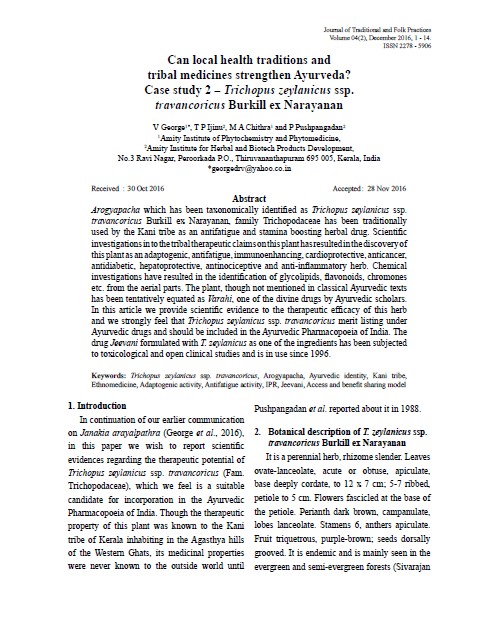Can local health traditions and tribal medicines strengthen Ayurveda? Case study 2 – Trichopus zeylanicus ssp. travancoricus Burkill ex Narayanan
Keywords:
Trichopus zeylanicus ssp. travancoricus, Arogyapacha, Ayurvedic identity, Kani tribe, Ethnomedicine, Adaptogenic activity, Antifatigue activity, IPR, Jeevani, Access and benefit sharing modelAbstract
Arogyapacha which has been taxonomically identified as Trichopus zeylanicus ssp. travancoricus Burkill ex Narayanan, family Trichopodaceae has been traditionally used by the Kani tribe as an antifatigue and stamina boosting herbal drug. Scientific investigations in to the tribal therapeutic claims on this plant has resulted in the discovery of this plant as an adaptogenic, antifatigue, immunoenhancing, cardioprotective, anticancer, antidiabetic, hepatoprotective, antinociceptive and anti-inflammatory herb. Chemical investigations have resulted in the identification of glycolipids, flavonoids, chromones etc. from the aerial parts. The plant, though not mentioned in classical Ayurvedic texts has been tentatively equated as Varahi, one of the divine drugs by Ayurvedic scholars. In this article we provide scientific evidence to the therapeutic efficacy of this herb and we strongly feel that Trichopus zeylanicus ssp. travancoricus merit listing under Ayurvedic drugs and should be included in the Ayurvedic Pharmacopoeia of India. The drug Jeevani formulated with T. zeylanicus as one of the ingredients has been subjected to toxicological and open clinical studies and is in use since 1996.


